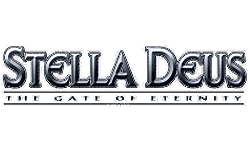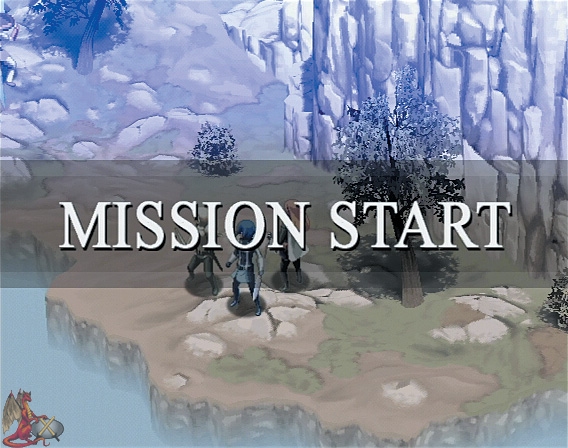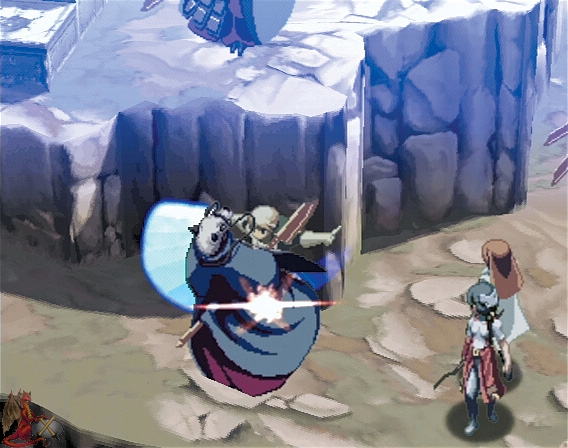|
|

|
BATTLE SYSTEM
|

|
INTERACTION
|

|
ORIGINALITY
|

|
STORY
|

|
MUSIC & SOUND
|

|
VISUALS
|

|
CHALLENGE
|
Medium
|
COMPLETION TIME
|
30-40 Hours
|
|
OVERALL
2.0/5.0
|
Rating definitions
|
|
|
While once upon a time a Tactical RPG was considered the rare treat for North America, lately whenever an RPGamer gets a craving for one, there are multiple choices to fill their appetites. Atlus has long been a company known for their love of the tactical genre, bringing over numerous quality games such as the Ogre Battle series. So, it came as no giant surprise to see them undertake Stella Deus: The Gate of Eternity. While the game seems to be on the surface a novel entry with a good storyline, decent voice acting, and a different art style, it is bogged down by a slow and somewhat flawed battle system, poor music, and poor balance.
The battle system is set up in an interesting fashion. Those who have played Vanguard Bandits will find some similarities between the two systems. The battle scene is laid out on a grid of squares with the usual assortment of obstructions as well as terrain of different heights. Initially, each character begins their turn with 100 points, and with these points they may attack, use items, move, or sit the turn out. A display at the top of the screen shows the order in which the characters may act. Each character's movement and attacks cost depends upon the weight they are carrying. Higher defense on an item usually means higher weight, which leads to greater costs for movement and attacks. This gives both the player and the enemies a golden opportunity: characters can attack as many times as they like during their turn providing they still have the points to do so. This means, for example, an ally character can walk a step or two and still set off two attacks; a second example would be that a healer can use their magic spells to heal more than once during a turn. This leads to many battles where the player is forced to have his characters take only a couple steps forward, waiting for the enemies to approach in an advantageous fashion. For those who run out of playtime, a suspend option is available during battle so a player can pick up again later. Additionally, characters have 4 slots to assign to either items usable in battle or accessories which boost the character.
 Starting Small
Starting Small
|
|
A successful attack, spell, or use of an item nets the character both experience and SP. SP can be spent in two different ways to upgrade your character. The first being to buy new attacks, spells, passive abilities, and area effects; which of these will be available vary with the character's class. The second use is to upgrade a character's stats, which will directly effect their combat prowess. Special attacks and spells use MP as well as requiring a larger amount of points than regular attacks, but have devastating effects against enemies. Passive abilities vary from allowing Team Attacks in various incarnations, to additonal stats such as STR +10%, and area effects can range from various abilities including allowing allies to dodge more attacks to inflicting damage or status effects against enemies. Characters can upgrade to new classes every 10 levels providing they meet the stat requirements as well as have the correct item in inventory to upgrade them (though this process changes later in the game). So it becomes decision time: should SP be spent on abilities or the stats needed to round out a character or perhaps class them up? There isn't much way to tell which is better, so it is often touch and go when deciding what exactly to do with characters. In the end the biggest problem with the battle system is that it is slow, tedious, and generally on the boring side. Not exactly the way a tactical game wants to be known.
The visuals found in Stella Deus are unusual, though not unappealing. Most of the graphics look like they've been pulled right off a sketching board, a far cry from the ultra-realistic approach of many other RPGs nowadays. Both the characters and backgrounds are well fleshed out and it is an appealing style to play out, even if the rest of the game isn't as enjoyable. As for the music, while it does its job and fills in the moment with appropriate sounds, it doesn't do much beyond setting a decent mood and thankfully not being too annoying for the players.
The difficulty of Stella Deus will depend on how much time is spent levelling outside of the main missions. While many other tactical games rely on players levelling besides the main missions, here there is only one place to do so: in the Catacombs. While you can choose to brave the depths at any time, the deepest level available in the Catacombs is restricted until specific storyline missions are passed. Each level has a variety of enemies identical to the dungeon level - so, level 10 enemies are found on the 10th floor. The problem is, the game never really points players in the direction of the Catacombs as a necessary part of the levelling process, which leads to more than one disgruntled RPGamer experiencing a game over before they begin slogging through. Because of this added time required to level up, the completion time sneaks upwards to at least 30 hours, and it is very likely it will take longer than that. It is unfortunate so much time is spent grinding in the game.
 Bad Nox, Bad!
Bad Nox, Bad!
|
|
The menu system is pretty standard for an RPG of this type. The town menu has a number of different choices: one of these options is the Guild, where one can go to get missions and other information not available during the main path of the story. These missions vary from notes about good strategies to going out and participating in additional battles to playing messenger boy. As well, at a guild 2 items can be combined to make one new item. While this is a seemingly neat idea, few of the fusions are particularly useful and the better ones require items the player generally won't want to give up. The catacombs are also in town, and a shop is present here for those wishing to stock up on new equipment, accessories, or items. A tutorial is always available in this menu and the save/load screen is available here or simply by pressing Start. As for the localization, it is one of the more polished aspects of the game, with the characters having witty and often surprisingly amusing dialogue. Few RPGs have a disgruntled guard suggest his captive and a party member get a room in disgust at their antics. Though there are a few odd grammatical and spelling errors, they do not interfere with the general flow of the game, making the translation a bright point in an otherwise dull title.
While Stella Deus tries hard to be original, it lacks in several key areas. The storyline of religion as the primary source of conflict has been thoroughly done, though the game does give it a new twist - the religion is apathetic instead of proactive; but as per the usual story it seems someone or something is pulling the strings from backstage. It isn't that the storyline is bad by any stretch, as it is actually the strongest part of the game, it simply isn't terribly original. Also lacking in originality are the battle and levelling systems, which both relate back to TRPGs available on the PlayStation which explored both of these features thoroughly. Had more thought been put into the originality of the game, it wouldn't be as much of a bore.
If Stella Deus were a book, it would be an excellent read and grace any good bookshelf. As a game, however, it comes up lacking in several key elements, such as a battle system that will suck the player in, which are really what makes the basis of a solid TRPG. With the market for such niche games expanding at a very regular pace, especially on the PS2, tactical games are being held to a new standard, alongside many of Nippon Ichi's games. While Stella Deus has a lot of good ideas and a couple positive points, there's just too much bogging it down to make it really stand out in a competitive market. For those who just can't get enough tactical mastery, consider picking it up. Those that prefere lighter portions should likely steer clear for a more well-received game.
Review Archives
|









